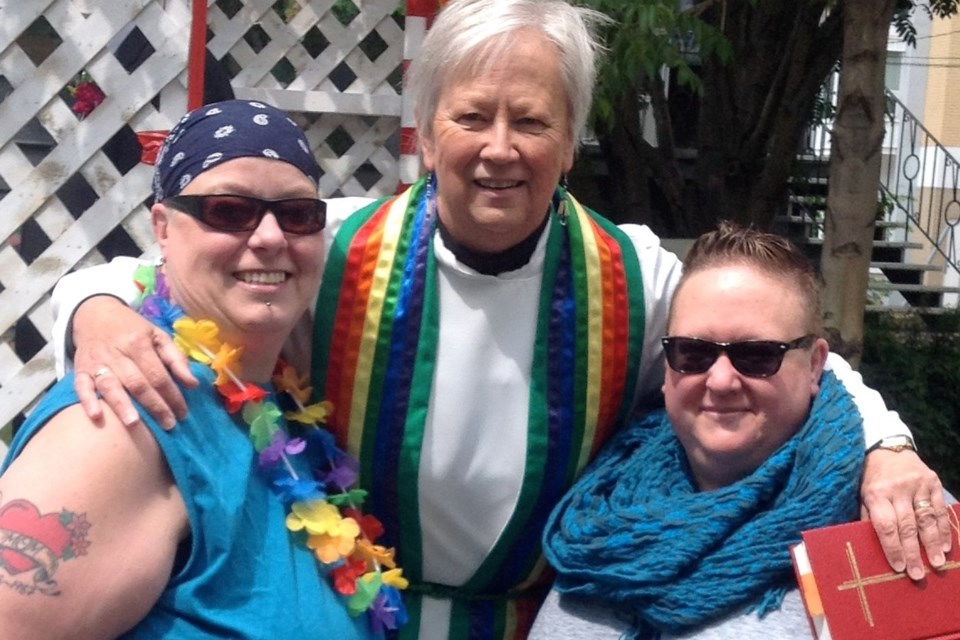A hotel hot tub changed Erin Beckwell's life.
The Saskatoon woman had been to dinner with her partner, who then endlessly drove her around the city.
"I'm like, 'Where are you taking me?'" said Beckwell, a university professor. "I'm not great at waiting for surprises and I just wanted to know."
The suspense continued at a hotel suite on that chilly December night in 2002. Under the guise that it was a staycation, Beckwell took a dip.
"She proposed to me while I was lounging in the hot tub," she said. "She did the whole down-on-one-knee, and I just remember thinking, 'Oh, my God. This is really happening.'
"There was no doubt about saying yes."
Erin and Lisa Beckwell were the first gay couple to legally tie the knot in Saskatchewan, after it became the seventh province to recognize same-sex unions in November 2004.
This July, Canada will mark 20 years since it legalized same-sex marriage.
It was the peak of a lengthy journey in granting rights for LGBTQ+ Canadians, who once were fired or jailed for having sex with someone of the same gender. Homosexuality was decriminalized in 1969, but sexual orientation wasn't included in the Canadian Human Rights Act until 1996.
Beckwell said the pair held a commitment ceremony one month earlier. She donned a white, straitlaced dress with a train, while her spouse-to-be opted for a "very dashing" tuxedo.
"I had a friend describe it as the straightest gay wedding they'd ever been to," said Beckwell.
After the ruling, they got a marriage licence and held a second ceremony open to the public and the news media. While travelling for their honeymoon in Mexico, they were stopped by people who recognized them from TV and newspapers.
Aside from a few naysayers, Beckwell said they had a warm reception.
"It was so surreal."
While provinces including Saskatchewan and Ontario amended laws before the federal government, others pushed back.
Mark and Craig Stumpf-Allen have considered themselves married since 1995, when a minister recognized and blessed their union, even though the Alberta government didn't.
Then-premier Ralph Klein had long called same-sex marriage "morally wrong," and urged federal politicians to "defend the traditional definition of marriage." He also planned to use the notwithstanding clause, which allows governments to override certain Charter rights for up to five years, to block their recognition.
So, when the Edmonton couple visited a registry office to ask for a marriage licence, they were surprised to get one.
"The poor woman behind the counter had no idea she was supposed to discriminate against us," said Craig Stumpf-Allen. "By the time we got home, there was a message saying, 'We issued that in error, we need it back.'"
Instead of returning it, they framed it and got married on Family Day.
While Klein stood down after the federal ruling, the pair never made their bond legal. Their common-law relationship grants them the same rights as a married couple, and their friends and family already see them as married.
"We had nothing to gain from it," said Mark Stumpf-Allen. "With recent changes in the world and the far right gaining momentum in Alberta, I don't know if it would be to our advantage now."
Alberta’s United Conservative Party government has passed laws that, among other things, restrict minors from receiving gender-affirming care, remove transgender athletes from female amateur sports and require parents' consent before allowing children to change their names or pronouns at school.
Saskatchewan passed a similar pronoun law in 2023.
Beckwell said legislation like this is "frightening."
"I just worry that with all that's happening in the world right now, we're going to go backwards," she said.
Craig Stumpf-Allen said he doesn't see the level of opposition from decades ago coming back.
"I don't think Canada will go that way," he said.
Looking back, Erin Beckwell said it's "kind of wild" that 20 years have passed. She and her wife haven't quite figured out their secret to married bliss, but humility, grace and counselling play a role.
As for Craig Stumpf-Allen, he said it's "dumb luck."
This report by The Canadian Press was first published Feb. 13, 2025.
Aaron Sousa, The Canadian Press



